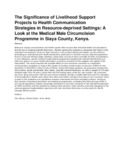Please use this identifier to cite or link to this item:
http://ir-library.mmust.ac.ke:8080/xmlui/handle/123456789/1980| Title: | The Significance of Livelihood Support Projects to Health Communication Strategies in Resource-deprived Settings: A Look at the Medical Male Circumcision Programme in Siaya County, Kenya |
| Authors: | Osir, Otteng Kiptoo, Michael Wenje, Peres Nyawanga |
| Keywords: | Significance, Livelihood, Support, Projects, Health, Communication, Strategies, Resource-deprived, Settings, Medical, Male, Circumcision, Programme |
| Issue Date: | 30-Jun-2020 |
| Publisher: | Research on Humanities and Social Sciences |
| Abstract: | Behaviour change communicators and health experts often assume that individual beliefs and perceptions hold the key to explaining health behaviours, thereby ignoring the extraneous constraints that obtain in the individual’s environment. Access to basic resources, such as food clothing and shelter, can be central to developing an understanding for health transactions, particularly in severely resource-deprived populations found in rural and informal urban dwellings, where basic survival at times overrides all other considerations. In such situations, specific livelihood improvement programmes targeting the intended beneficiaries and other key players in a given health intervention could be an incentive for the adoption and uptake of the intervention. This study examined the possible effects of socio-economic incentives to complement communication campaigns to improve the uptake of voluntary medical male circumcision (VMMC) for the prevention of HIV/AIDS in Siaya County of Kenya. Using multi-stage sampling, we purposively selected two sub-counties, Bondo and Rarieda, from where, using the snowball technique, we drew a sample of 370 male residents aged 18 to 49 years, mainly from the fish landing areas of the two sub-counties. We conducted two focus group discussions with men and women residents, besides in-depth interviews with five managers of the programme. Results were drawn from direct and indirect questions touching on socio-economic issues covered in the qualitative and quantitative research instruments and from anecdotal evidence. We found that, besides conventional prevention and treatment programmes, combating HIV/AIDS through VMMC in low-income populations requires reasonable investment in economic assistance to the intended beneficiaries of VMMC and those with the potential to influence their decision. These activities should be integrated in the wider programme implementation spectrum with clear structures that serve as entry points for health message delivery points. |
| URI: | https://doi.org/10.7176/RHSS/10-12-06 https://iiste.org/Journals/index.php/RHSS/article/view/53067 http://ir-library.mmust.ac.ke:8080/xmlui/handle/123456789/1980 |
| Appears in Collections: | Journal Articles |
Files in This Item:
| File | Description | Size | Format | |
|---|---|---|---|---|
| The Significance of Livelihood Support Projects to Health Communication Strategies in Resource.pdf | 260.31 kB | Adobe PDF |  View/Open |
Items in DSpace are protected by copyright, with all rights reserved, unless otherwise indicated.
